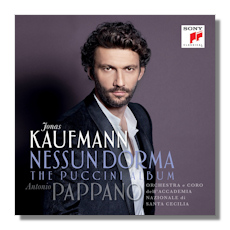
The Internet's Premier Classical Music Source
Related Links
- Puccini Reviews
- Latest Reviews
- More Reviews
-
By Composer
-
Collections
DVD & Blu-ray
Books
Concert Reviews
Articles/Interviews
Software
Audio
Search Amazon
Recommended Links
Site News
 CD Review
CD Review
Giacomo Puccini

Nessun Dorma - The Puccini Album
- Manon Lescaut:
- Act I: Donna non vidi mai
- Act II: Oh, sarò la più bella!… Tu, tu, amore? Tu? *
- Act II: Ah! Manon mi tradisce *
- Act III: Presto! In fila!… Non v'avvicinate! No, pazzo son! **
- Le Villi, Act II: Ei giunge!… Torna ai felici dì
- Edgar, Act II: Orgia, chimera dall'occhio vitreo
- La Bohème, Act I: O soave fanciulla *
- Tosca, Act I: Recondita armonia **
- Madama Butterfly, Act III: Addio, fiorito asil ***
- La Fanciulla del West:
- Act II: Una parola sola!… Or son sei mesi
- Act III: Risparmiate lo scherno… Ch'ella mi creda libero ***
- La Rondine, Act I: Parigi! È la città dei desideri
- Il Tabarro, Hai ben ragione
- Gianni Schicchi, Avete torto!… Firenze e come un albero fiorito
- Turandot:
- Act I: Non piangere, Liù! */**
- Act III: Nessun dorma
Jonas Kaufmann, tenor
* Kristine Opolais, soprano
** Antonio Pirozzi, baritone
*** Massimo Simeoli, baritone
Accademia Nazionale di Santa Cecilia Orchestra & Chorus/Antonio Pappano
Sony Classical 8887-509249-2 60:43
Also available on Deluxe CD+DVD Edition 8887-509248-2: Amazon - UK - Germany - Canada - France - Japan - ArkivMusic - CD Universe - JPC
Puccini mavens may have noticed from the heading that Jonas Kaufman has chosen one or more selections from every Puccini opera, except of course the all-female Suor Angelica. This is obviously going to be a top-selling album, not least because this superstar tenor sings his heart out in number after number. But in addition, he is supported excellently by Sir Antonio Papano and the Accademia Nazionale di Santa Cecilia Orchestra & Chorus. And in several selections he is joined by the brilliant soprano Kristine Opolais, a major opera star in her own right, and the talented baritones Antonio Pirozzi and Massimo Simeoli.
Kaufman's rich, slightly dark tenor voice is well suited to every number on the album here. I recently read commentary to the effect that his squillo is supposedly not quite as consistent as it could be, but I must say I don't notice any such inconsistency here. Nor can I point out any other shortcomings in his technique or, for that matter, in his interpretations or dramatic skills. As with his previous recordings that I have reviewed here, which include Schubert's Winterreise (Sony 79565) and a Verdi collection (Sony 49204), his performances are basically beyond cavil, unless you want to nitpick.
Kaufman leads off with four numbers from Manon Lescaut, still perhaps the composer's most overlooked (though not necessarily neglected) opera, despite the fact it was quite popular in its day. He sings Donna non vidi mai simply beautifully: the softer moments at the ends of phrases are especially stunningly sung. Kristine Opolais joins him in Oh, sarò la più bella!… Tu, tu, amore? Tu? and both are fully convincing, even if Ms. Opolais is a bit reticent in places. The latter half of this masterly number is meltingly beautiful here, just full of passion and electricity.
The sole number from Le Villi, the composer's first opera, offers a fired-up chorus at the outset and Kaufman in a very dramatic mood, very passionate mood. The brilliantly portrayed rueful character of Orgia, chimera dall'occhio vitreo from Edgar continues the dark moods, but oh so disarmingly. The sweet and passionate romance of O soave fanciulla comes as a respite, as once again Opolais and Kaufman make a splendid duo. The seemingly ubiquitous number Recondita armonia is sung with as much passion and vocal resplendence as you could want. There are more substantial and better selections from Madama Butterfly that could have been made, but Kaufman sings the charming nugget Addio, fiorito asil with his usual all-out commitment and is aided nicely by Massimo Simeoli, as Sharpless.
Kaufman's mahogany-tinted rich sound resonates so convincingly in Parigi! È la città dei desideri, from La Rondine, and Hai ben ragione, from Il Tabarro. Nessun Dorma closes out the disc of course, and it's no surprise Kaufman's rendition is beautifully sung, but I always wonder that Puccini may have made one of his few mistakes when on the second appearance of the big theme he decided to have the chorus sing the first part accompanied by quivering strings. Why not just have the tenor take it up again? The music and voice are so well matched here. Yes, a crucial adjustment in the libretto would have been necessary to accommodate such a change, but I'm sure that could have been worked out.
Sony's sound reproduction is vivid and powerful, and the album notes are informative and feature full texts. Highly recommended!
Copyright © 2015, Robert Cummings





















